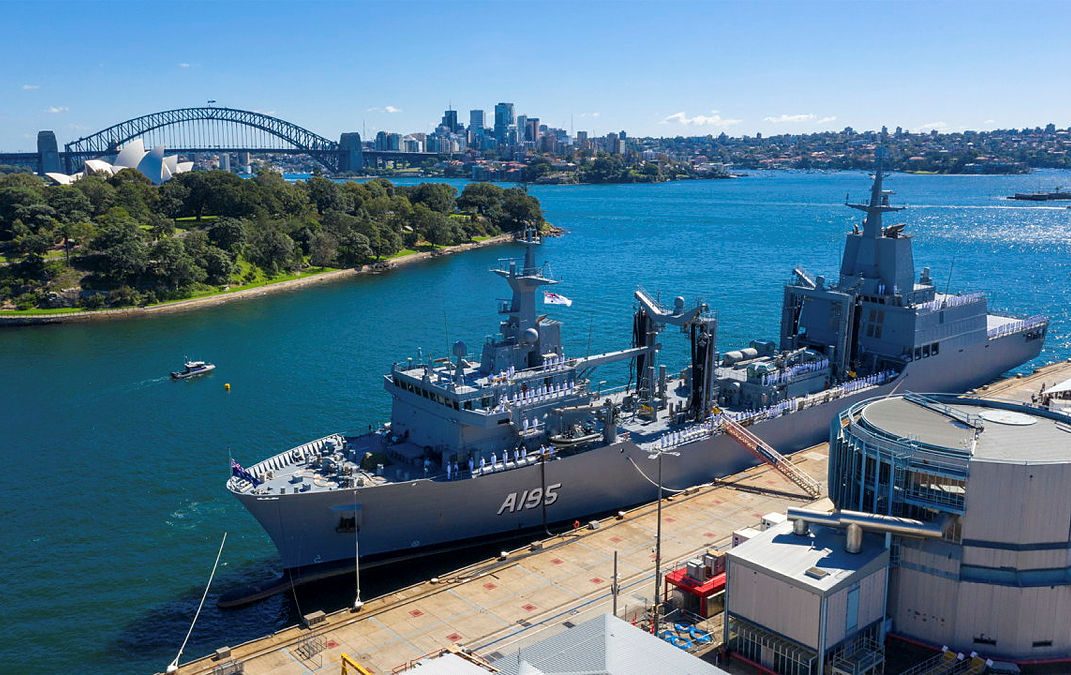
Sea state
The Royal Australian Navy has commissioned a new auxiliary oiler replenishment (AOR) ship, HMAS Supply, which replaces the retired HMAS Success. One of two AORs built by Spanish company Navantia, Supply will be based at Fleet Base East in Sydney, while sister ship NUSHIP Stalwart, which is expected to arrive later this year, will be based near Perth at Fleet Base West. These multipurpose vessels carry fuel, cargo, ammunition and supporting equipment for naval forces on deployment. They can also support humanitarian assistance and disaster relief operations.
Indonesia has commenced relocating its marine combat headquarters from Jakarta to the Natuna Islands and anticipates the new base will be fully operational by the end of the year. The new headquarters is a deterrent statement to foreign vessels to desist from incursions into Indonesia’s exclusive economic zone. The move is also aimed at China, whose territorial claims and coastguard and fishing vessel incursions are a source of bilateral tension. Indonesia maintains a neutral ‘non-claimant’ status in the South China Sea, but its expanding military presence and patrols in the Natunas indicate an increasingly assertive territorial posture.
Flight path
Last month, the Royal Air Force, with other coalition planes, engaged in the largest bombing campaign against Islamic State in years, targeting up to 100 cave hideouts in Iraq. The 10-day operation involved Eurofighter Typhoon aircraft, which conducted multiple strikes and included the first operational use of the bunker-busting Storm Shadow cruise missile from a Typhoon. The UK Ministry of Defence said the operation builds on earlier successful air strikes against IS, and represented a significant increase in activity from previous months.
On 9 April, Korea Aerospace Industries unveiled the prototype of South Korea’s first indigenous fighter aircraft, the KF-21 Boramae, which is designed to replace the ageing fleet of F-4D/E Phantom II and F-5E/F Tiger II aircraft. South Korean officials have called it a 4.5-generation fighter; it’s likely to be on par with the F-16V but less stealthy than the F-35. Some analysts predict, however, that it will compete with the F-35 in terms of altitude and speed. The KF-21 is a joint development between South Korea and Indonesia, with the prototype’s first test flight scheduled for next year. The Republic of Korea Air Force is set to receive 40 jets by 2028.
Rapid fire
A senior US Air Force commander has criticised the US Army for prioritising its ‘long-range fires’ program. USAF Global Strike Command chief Timothy Ray said the Defense Department shouldn’t invest further on the long-range fires plan because it’s ‘expensive, duplicative and “stupid”’. Defense News reports the program is the army’s top priority, so it seems unlikely that USAF criticism will spur any major recalculation. The Biden White House, meanwhile, has released its first defence budget proposal, though it’s not yet clear how the funding will be distributed among the different branches of the military.
Diggerworks, a program that aims to develop more suitable combat equipment and uniforms for female soldiers, has been initiated by the Department of Defence’s Capability Acquisition and Sustainment Group. In the next 12 months, equipment such as boots and body armour designed for female soldiers will be distributed to thousands of servicewomen around Australia for testing and evaluation. Captain Liz Normand from the Royal Victoria Regiment said Diggerworks has come up with products that will strengthen female soldiers’ capability in combat.
Final frontier
Monday was the 60th anniversary of human spaceflight, marked by Russian Yuri Gagarin’s historic voyage on 12 April 1961 in the Vostok 1 capsule. Gagarin completed a full orbit of the earth, spending 1 hour and 48 minutes in flight during which he lost radio contact for 23 minutes. Upon re-entry, Gagarin experienced heavy g-forces as the Vostok 1 capsule spiralled, before he ejected and parachuted to safety, landing in Kazakhstan. Gagarin’s journey was a watershed moment in human space exploration, and widely regarded as kick-starting the space race.
As competition in outer space heats up, the International Committee of the Red Cross has highlighted the potential impacts of conflicts in space on civilians on earth. In a submission to the UN General Assembly, the ICRC urges countries to include international humanitarian law in discussions on space and acknowledge the threats that using weapons in space pose to people, services and infrastructure. The submission notes that ‘the weaponization of outer space is not inevitable but a choice’ and encourages nations to recognise that ‘military operations in outer space do not occur in a legal vacuum but are constrained by existing law’.
Wired watchtower
Israel has been accused by Iran of being behind cyberattacks on the electrical distribution grid of its Natanz nuclear facility. Israel has neither confirmed nor denied responsibility. The attack occurred a day after the Iranian government announced it was upgrading centrifuges at the facility in violation of its commitments under the 2015 nuclear deal. Israel alleges that Iran is seeking to build nuclear weapons and Israeli Prime Minister Benjamin Netanyahu said following the incident that ‘the struggle against Iran and its proxies and the Iranian armament efforts is a huge mission’.
Renewed concerns about protection of individuals’ privacy on Facebook have surfaced following a VICE News report that people can pay to access Facebook users’ phone numbers using an online tool. When customers provide the tool with the unique identification code of a Facebook page and pay a fee, they are sent a spreadsheet with the names and phone numbers of everyone who has liked the page. This new breach adds to Facebook’s security woes after last week’s revelation that 533 million users’ personal details have been leaked, including phone numbers, physical addresses, email addresses and relationship status.

